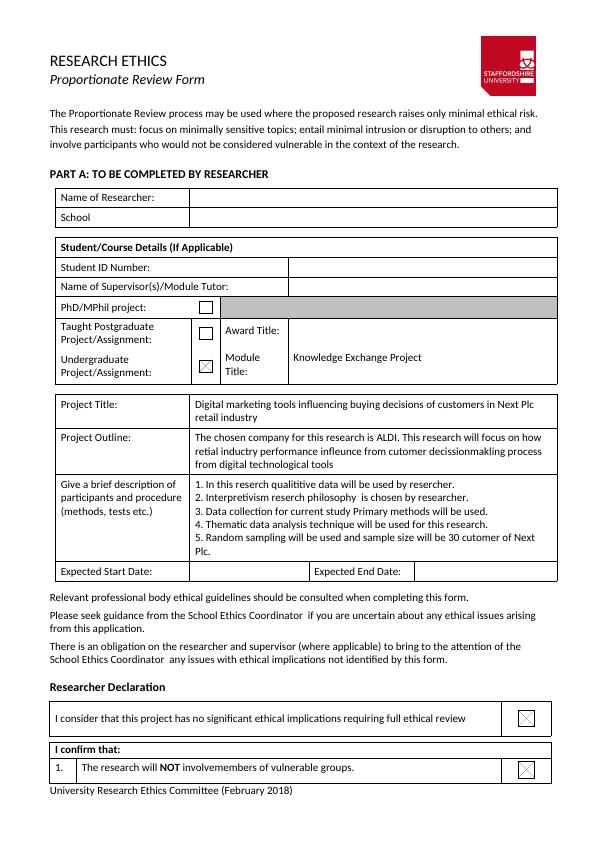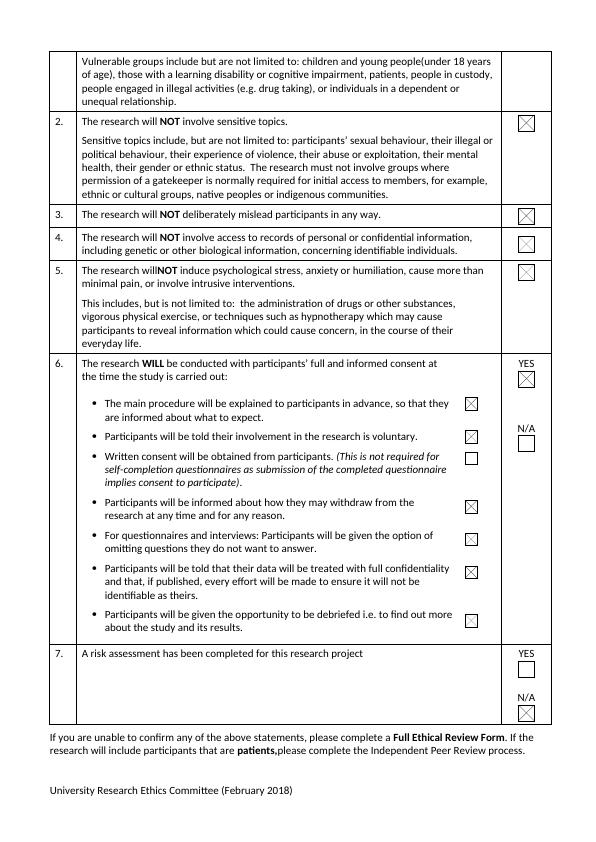Research Ethics for Digital Marketing Tools Influencing Buying Decisions of Customers in Retail Industry
Added on 2023-06-16
4 Pages1547 Words194 Views
RESEARCH ETHICS
Proportionate Review Form
The Proportionate Review process may be used where the proposed research raises only minimal ethical risk.
This research must: focus on minimally sensitive topics; entail minimal intrusion or disruption to others; and
involve participants who would not be considered vulnerable in the context of the research.
PART A: TO BE COMPLETED BY RESEARCHER
Name of Researcher:
School
Student/Course Details (If Applicable)
Student ID Number:
Name of Supervisor(s)/Module Tutor:
PhD/MPhil project:
Taught Postgraduate
Project/Assignment: Award Title:
Module
Title:
Knowledge Exchange ProjectUndergraduate
Project/Assignment:
Project Title: Digital marketing tools influencing buying decisions of customers in Next Plc
retail industry
Project Outline: The chosen company for this research is ALDI. This research will focus on how
retial inductry performance infleunce from cutomer decissionmakling process
from digital technological tools
Give a brief description of
participants and procedure
(methods, tests etc.)
1. In this reserch qualititive data will be used by resercher.
2. Interpretivism reserch philosophy is chosen by researcher.
3. Data collection for current study Primary methods will be used.
4. Thematic data analysis technique will be used for this research.
5. Random sampling will be used and sample size will be 30 cutomer of Next
Plc.
Expected Start Date: Expected End Date:
Relevant professional body ethical guidelines should be consulted when completing this form.
Please seek guidance from the School Ethics Coordinator if you are uncertain about any ethical issues arising
from this application.
There is an obligation on the researcher and supervisor (where applicable) to bring to the attention of the
School Ethics Coordinator any issues with ethical implications not identified by this form.
Researcher Declaration
I consider that this project has no significant ethical implications requiring full ethical review
I confirm that:
1. The research will NOT involvemembers of vulnerable groups.
University Research Ethics Committee (February 2018)
Proportionate Review Form
The Proportionate Review process may be used where the proposed research raises only minimal ethical risk.
This research must: focus on minimally sensitive topics; entail minimal intrusion or disruption to others; and
involve participants who would not be considered vulnerable in the context of the research.
PART A: TO BE COMPLETED BY RESEARCHER
Name of Researcher:
School
Student/Course Details (If Applicable)
Student ID Number:
Name of Supervisor(s)/Module Tutor:
PhD/MPhil project:
Taught Postgraduate
Project/Assignment: Award Title:
Module
Title:
Knowledge Exchange ProjectUndergraduate
Project/Assignment:
Project Title: Digital marketing tools influencing buying decisions of customers in Next Plc
retail industry
Project Outline: The chosen company for this research is ALDI. This research will focus on how
retial inductry performance infleunce from cutomer decissionmakling process
from digital technological tools
Give a brief description of
participants and procedure
(methods, tests etc.)
1. In this reserch qualititive data will be used by resercher.
2. Interpretivism reserch philosophy is chosen by researcher.
3. Data collection for current study Primary methods will be used.
4. Thematic data analysis technique will be used for this research.
5. Random sampling will be used and sample size will be 30 cutomer of Next
Plc.
Expected Start Date: Expected End Date:
Relevant professional body ethical guidelines should be consulted when completing this form.
Please seek guidance from the School Ethics Coordinator if you are uncertain about any ethical issues arising
from this application.
There is an obligation on the researcher and supervisor (where applicable) to bring to the attention of the
School Ethics Coordinator any issues with ethical implications not identified by this form.
Researcher Declaration
I consider that this project has no significant ethical implications requiring full ethical review
I confirm that:
1. The research will NOT involvemembers of vulnerable groups.
University Research Ethics Committee (February 2018)

Vulnerable groups include but are not limited to: children and young people(under 18 years
of age), those with a learning disability or cognitive impairment, patients, people in custody,
people engaged in illegal activities (e.g. drug taking), or individuals in a dependent or
unequal relationship.
2. The research will NOT involve sensitive topics.
Sensitive topics include, but are not limited to: participants’ sexual behaviour, their illegal or
political behaviour, their experience of violence, their abuse or exploitation, their mental
health, their gender or ethnic status. The research must not involve groups where
permission of a gatekeeper is normally required for initial access to members, for example,
ethnic or cultural groups, native peoples or indigenous communities.
3. The research will NOT deliberately mislead participants in any way.
4. The research will NOT involve access to records of personal or confidential information,
including genetic or other biological information, concerning identifiable individuals.
5. The research willNOT induce psychological stress, anxiety or humiliation, cause more than
minimal pain, or involve intrusive interventions.
This includes, but is not limited to: the administration of drugs or other substances,
vigorous physical exercise, or techniques such as hypnotherapy which may cause
participants to reveal information which could cause concern, in the course of their
everyday life.
6. The research WILL be conducted with participants’ full and informed consent at
the time the study is carried out:
The main procedure will be explained to participants in advance, so that they
are informed about what to expect.
Participants will be told their involvement in the research is voluntary.
Written consent will be obtained from participants. (This is not required for
self-completion questionnaires as submission of the completed questionnaire
implies consent to participate).
Participants will be informed about how they may withdraw from the
research at any time and for any reason.
For questionnaires and interviews: Participants will be given the option of
omitting questions they do not want to answer.
Participants will be told that their data will be treated with full confidentiality
and that, if published, every effort will be made to ensure it will not be
identifiable as theirs.
Participants will be given the opportunity to be debriefed i.e. to find out more
about the study and its results.
YES
N/A
7. A risk assessment has been completed for this research project YES
N/A
If you are unable to confirm any of the above statements, please complete a Full Ethical Review Form. If the
research will include participants that are patients,please complete the Independent Peer Review process.
University Research Ethics Committee (February 2018)
of age), those with a learning disability or cognitive impairment, patients, people in custody,
people engaged in illegal activities (e.g. drug taking), or individuals in a dependent or
unequal relationship.
2. The research will NOT involve sensitive topics.
Sensitive topics include, but are not limited to: participants’ sexual behaviour, their illegal or
political behaviour, their experience of violence, their abuse or exploitation, their mental
health, their gender or ethnic status. The research must not involve groups where
permission of a gatekeeper is normally required for initial access to members, for example,
ethnic or cultural groups, native peoples or indigenous communities.
3. The research will NOT deliberately mislead participants in any way.
4. The research will NOT involve access to records of personal or confidential information,
including genetic or other biological information, concerning identifiable individuals.
5. The research willNOT induce psychological stress, anxiety or humiliation, cause more than
minimal pain, or involve intrusive interventions.
This includes, but is not limited to: the administration of drugs or other substances,
vigorous physical exercise, or techniques such as hypnotherapy which may cause
participants to reveal information which could cause concern, in the course of their
everyday life.
6. The research WILL be conducted with participants’ full and informed consent at
the time the study is carried out:
The main procedure will be explained to participants in advance, so that they
are informed about what to expect.
Participants will be told their involvement in the research is voluntary.
Written consent will be obtained from participants. (This is not required for
self-completion questionnaires as submission of the completed questionnaire
implies consent to participate).
Participants will be informed about how they may withdraw from the
research at any time and for any reason.
For questionnaires and interviews: Participants will be given the option of
omitting questions they do not want to answer.
Participants will be told that their data will be treated with full confidentiality
and that, if published, every effort will be made to ensure it will not be
identifiable as theirs.
Participants will be given the opportunity to be debriefed i.e. to find out more
about the study and its results.
YES
N/A
7. A risk assessment has been completed for this research project YES
N/A
If you are unable to confirm any of the above statements, please complete a Full Ethical Review Form. If the
research will include participants that are patients,please complete the Independent Peer Review process.
University Research Ethics Committee (February 2018)

End of preview
Want to access all the pages? Upload your documents or become a member.
Related Documents
Impact of Digital Marketing on Productivity of a Firm: A Study on ThirdWay Grouplg...
|9
|2917
|491
Ethical Form for Primary and Secondary Researchlg...
|11
|2654
|333
Proportionate Review Form for Primary Research - Deskliblg...
|15
|2544
|298
Impact of Reward Systems on Employee Satisfaction in UK Retail Industry: A Study on Morrisonlg...
|11
|2649
|462
Impact of Training and Development on Employee Performance and Profitability: A Study on Hilton in UKlg...
|28
|2305
|265
Research Ethics Checklistlg...
|5
|1284
|95
